Follow us on Telegram for the latest updates: https://t.me/mothershipsg
The Singapore Food Agency (SFA) has started looking to allow the import and sale of insects and insect products for human consumption and animal feed in Singapore.
This means that some time in the near future, Singaporeans might be able to buy such products off local shelves and consume them wherever and whenever they want here.
The revelation that some people here might be crunching on the critters daily sent netizens into a frenzy of shock and disgust, but one Singaporean welcomed this piece of news.
"I actually was quite happy that they [the government] are actually allowing this to happen now," says Foo Maosheng.
Like Rice Krispies
Foo has been eating and incorporating insects into his diet since 2015.
He got his first taste when a colleague brought back some fried bamboo worms from Thailand.
Here's what they look like.
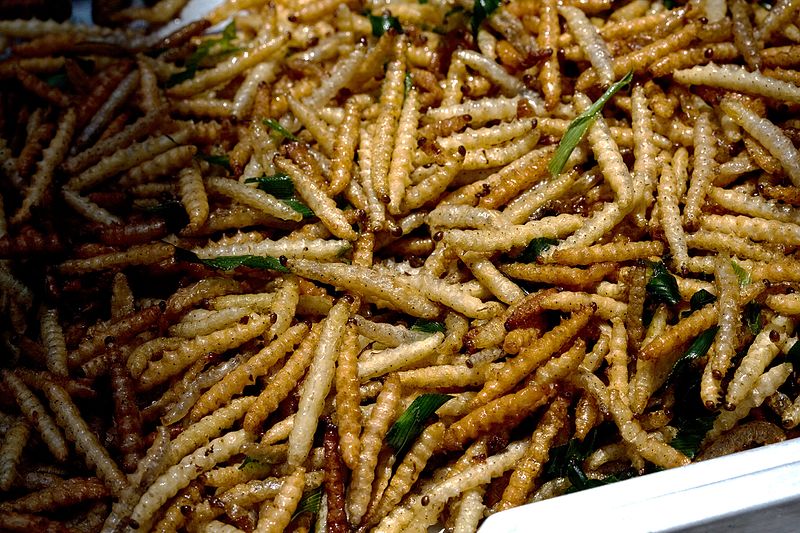 Photo from Wikipedia
Photo from Wikipedia
"It was actually not bad," the 34-year-old recalled. "It's a bit like eating Rice Krispies but just with less flavour."
Foo does not hold the same apprehension towards insects most people do.
As an entomologist studying bugs and other creepy-crawlies at the Lee Kong Chian Natural History Museum (National University of Singapore), eating insects, or entomophagy, as it's scientifically termed, is not a new concept to him.
He shared that prior to his first taste of insects, he was already aware of what it could potentially taste like, and thus when the opportunity presented itself, it was simply a moment of "okay, now that it's available for me, [there's] a chance to try, so just go ahead and try it".
"Even if I'm not an entomologist, I think I'll still be open to eating [insects]," Foo reflects.
Keeping a cockroach as a pet
Foo's fascination with bugs started as a young child, as is common among kids. Unlike others though, this interest did not fade into adulthood.
While other children frolicked around the playground, Foo recalls that he could typically be found crouched among the bushes and grass, in search of insects to collect and bring home.
A core memory for him is keeping a cockroach as his first "pet'.
Seven-year-old Foo had found it in his home, and later lured it with a piece of cut apple. He kept the cockroach for around a week in a small plastic container before another insect, a caterpillar, caught his attention.
He sustained this interest in bugs as he grew up, and Foo eventually went on to study environmental biology at the National University of Singapore.
2015 was the year Foo tried insects for the first time, sparking an all new gastronomic journey for him.
In search of other insects to try and new exotic flavour additions to his palate, he ventured online to search if any company in Singapore sells or distributes the products, but to no avail.
This is because the import and sale of insects for human consumption has not been authorised by SFA.
Foo later discovered online shops that sell the edible products he was looking for. One in particular, Thailand Unique, is located in the land of smiles but ships worldwide.
Eating it "like snacks"
Now, Foo purchases various packs of edible bugs from Thailand Unique once a year.
Each silver ziploc pack, adorned with labels with pictures of the bugs it contains, are actually rather affordable, costing around S$4 to S$5 per pack, excluding shipping fees.
One pack can last Foo two to three weeks.
Here is Foo's stash, which includes bugs such as crickets, sago worms, weaver ants, and cicadas.
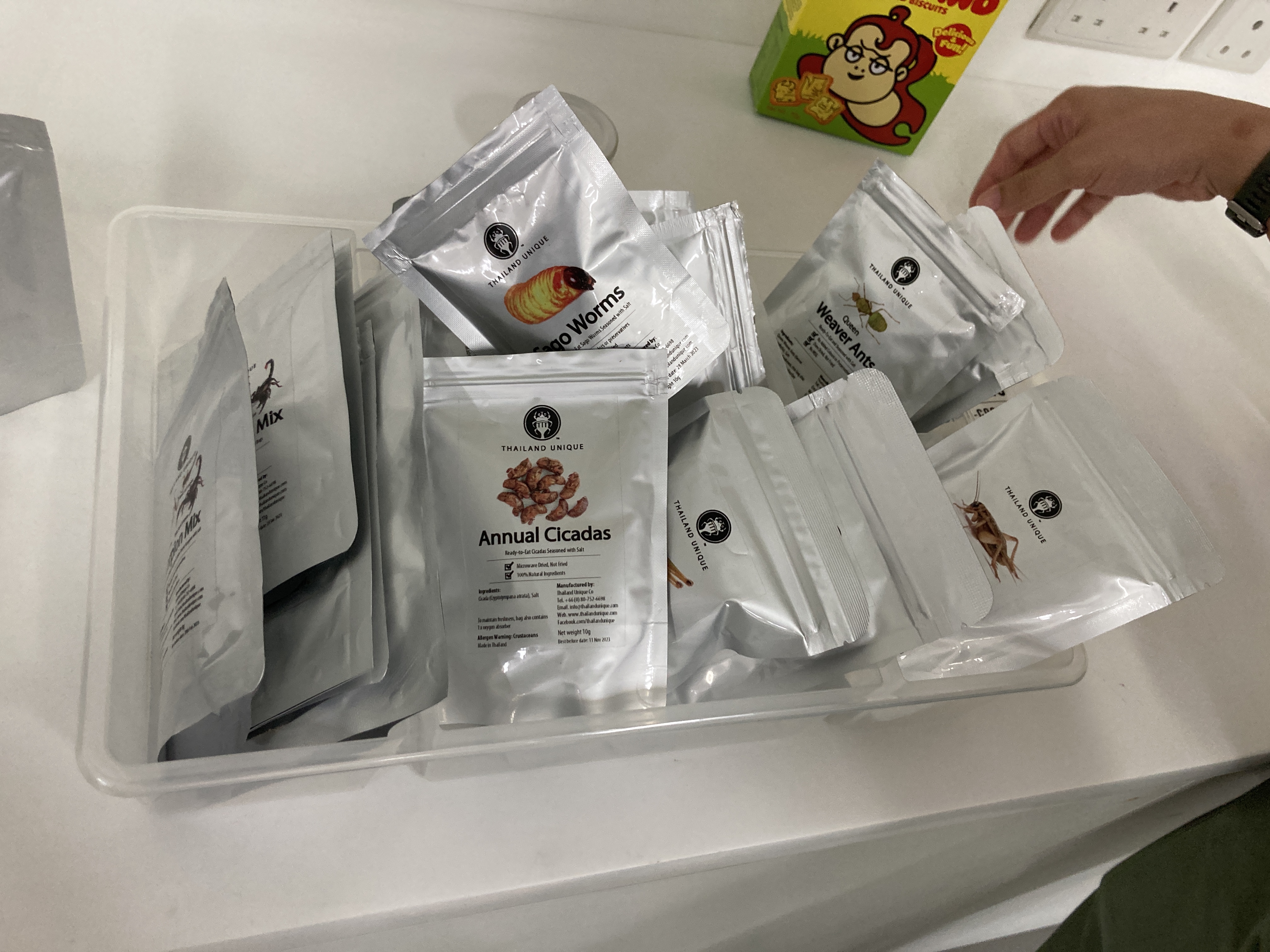 Photo by Ashley Tan
Photo by Ashley Tan
Foo shares that he munches on the insects like snacks and describes the texture as similar to nuts or biscuits.
He either eats them straight from the pack, or sprinkles them over his food dishes, like croutons on a salad, or furikake over his rice.
Occasionally, he bakes a mean pandan cake infused with bits of cricket. This, he explains, introduces a bit of a nutty taste to the sweet dessert.
When asked about his less-than wary reception to eating bugs, Foo ponders for awhile, and acknowledges that he is generally quite curious and open to trying new cuisines and foods.
"I do get that from my family. They always notice that I'm always trying new foodstuff instead of always going for the same popular or common food dishes that we can eat.
I'm not a foodie, just always open to trying new stuff."
Foo has tried introducing edible insects to his family, friends and colleagues, to mixed reactions. While some are willing to give it a try, others, more squeamish, keep the bugs at an arm's length.
"I have friends who say 'I'd rather die than eat that'."
Thus far, none of the people he knows have taken to eating insects quite like he has, and he recognises that he might one of the very few in Singapore who eats them regularly.
Bug benefits
You might be wondering why Foo chooses edible insects over conventional snacks like chips and nuts.
After all, the edible bugs aren't exactly more flavourful than the latter, and they aren't as easily accessible for purchase either.
Foo elaborates that the main draw for him is that being much more protein-rich, which makes bugs a healthier choice than other snacks.
"Better than eating too much carbs," he remarks.
The environmental benefits of bugs as food, over meat, for example, are a boon for him as well.
Agriculture is currently a significant contributor to global warming. Meanwhile, insect cultivation uses only a fraction of the land and other resources required for the farming of meat like beef and chicken.
Crickets produce up to 80 per cent less methane than cows, according to a study by researchers in the Netherlands. Additionally, replacing half of the meat eaten around the world with mealworms and crickets can reduce the use of farmland by one-third.
For Foo, Singapore's goal to produce 30 per cent of its food supply locally by 2030 aligns with his lifestyle of entomophagy as well.
Reviewing bugs: Fishy and salty
After expounding on the advantages of eating bugs, there's no way I can leave without at least trying some out, especially after Foo very kindly dug out his whole stash for the interview.
I've tried crickets and bamboo worms before — Foo calls them "starters", as they're the most common bugs that those new to entomophagy typically try first.
These usually have a nutty or salty taste, similar to dried salted fish.
Although Foo takes pains to elaborate on the different tastes of each bug — for example, cicadas have more earthy notes while the sago worms taste more fatty — the bug-eating amateur that I am finds that they all taste fishy and salty to me.
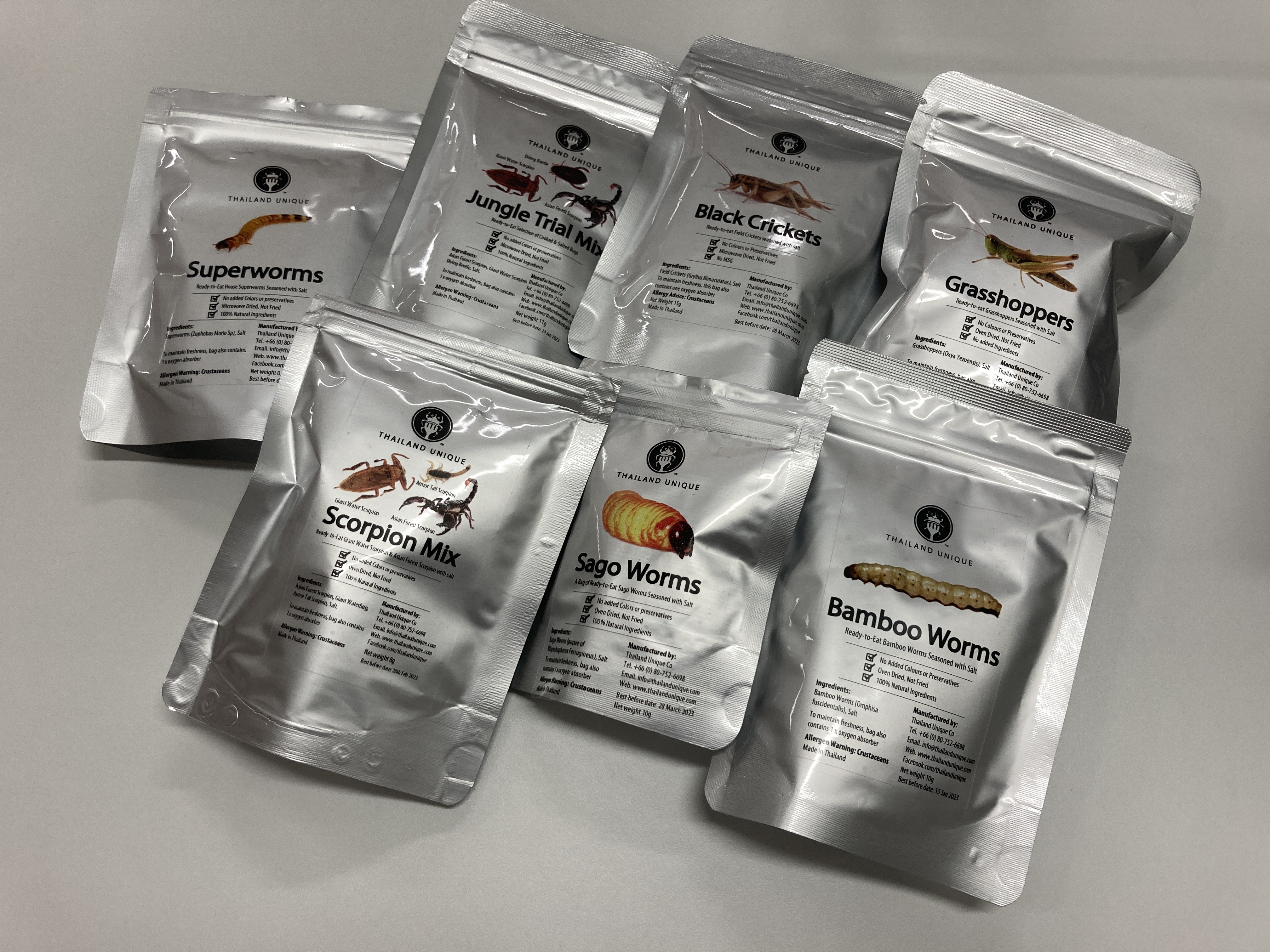 One of the packets is called Jungle Trail Mix. Photo by Ashley Tan
One of the packets is called Jungle Trail Mix. Photo by Ashley Tan
As the bugs come roasted in their packs, they're usually quite crispy and will crumble once you bite down.
To be very honest, they're not particularly aesthetically appealing either.
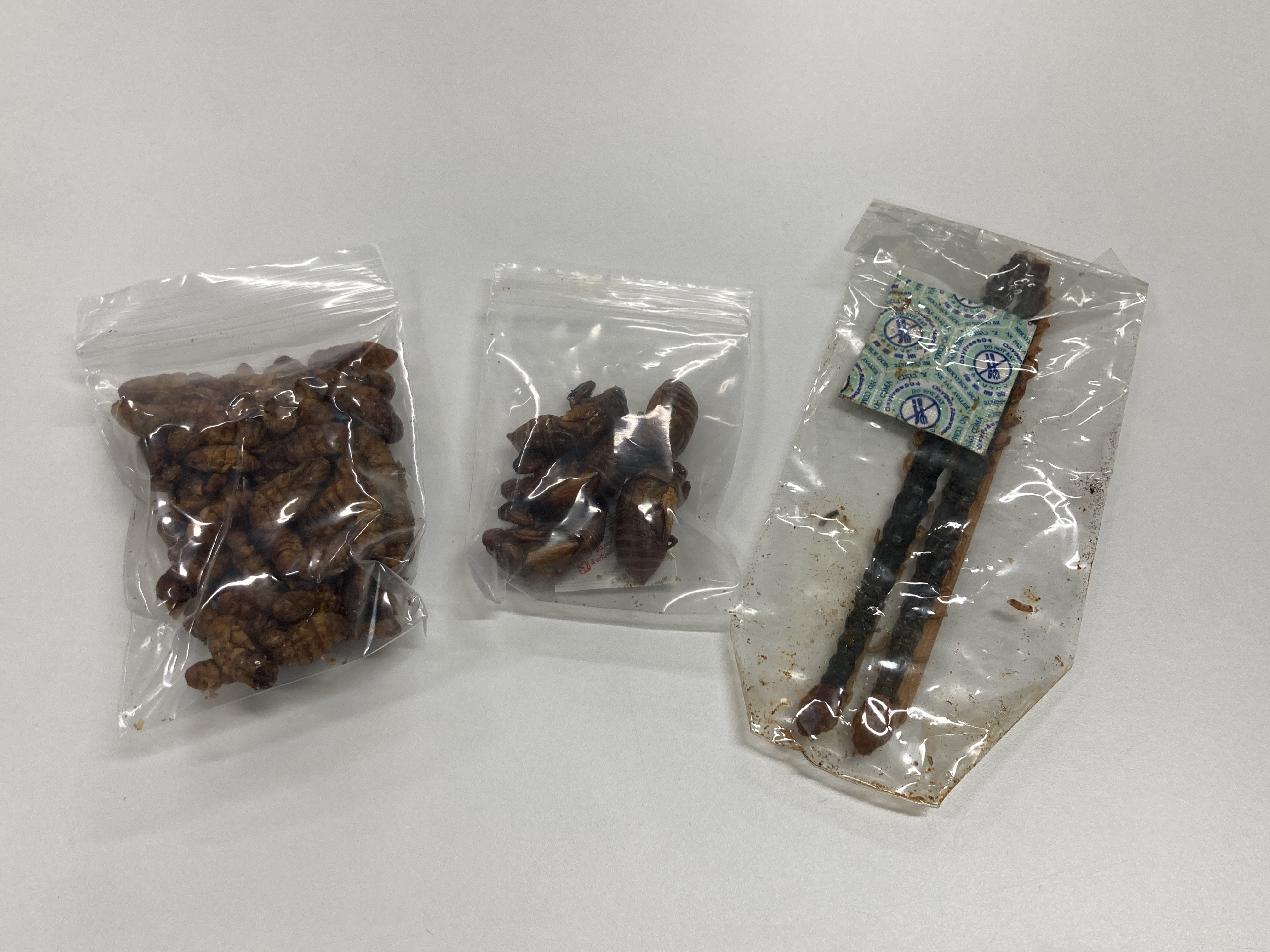 Silkworm pupae, cicadas and centipedes. Photo by Ashley Tan
Silkworm pupae, cicadas and centipedes. Photo by Ashley Tan
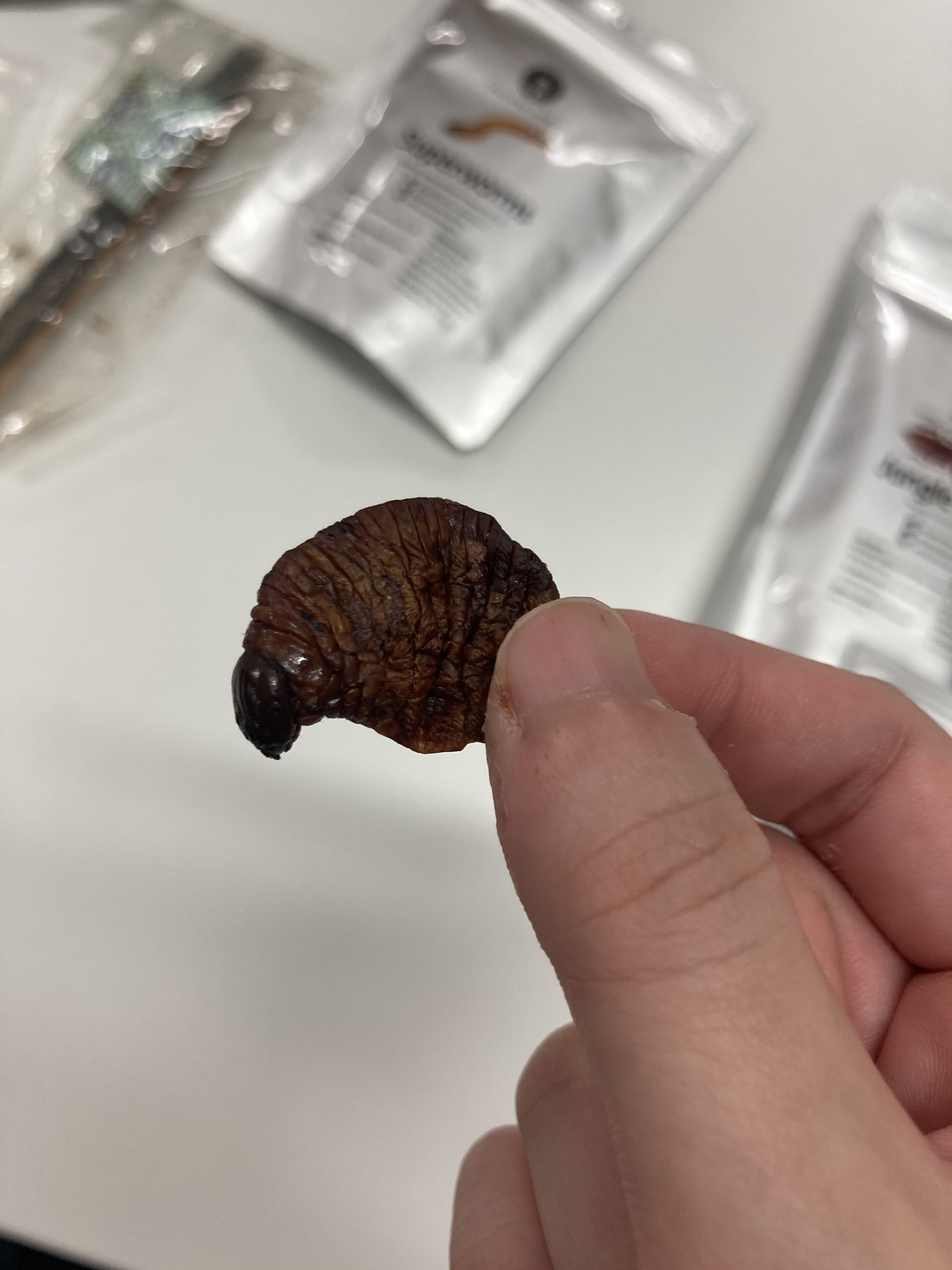 A fried sago worm. Photo by Ashley Tan
A fried sago worm. Photo by Ashley Tan
After trying some of the tamer specimens, Foo enthusiastically whips out a scorpion and very large water bug from their packs, much to my apprehension.
The water bug, he says, isn't very appetising, so I tentatively nibble on a very crisp leg, which ended up not really tasting like anything.
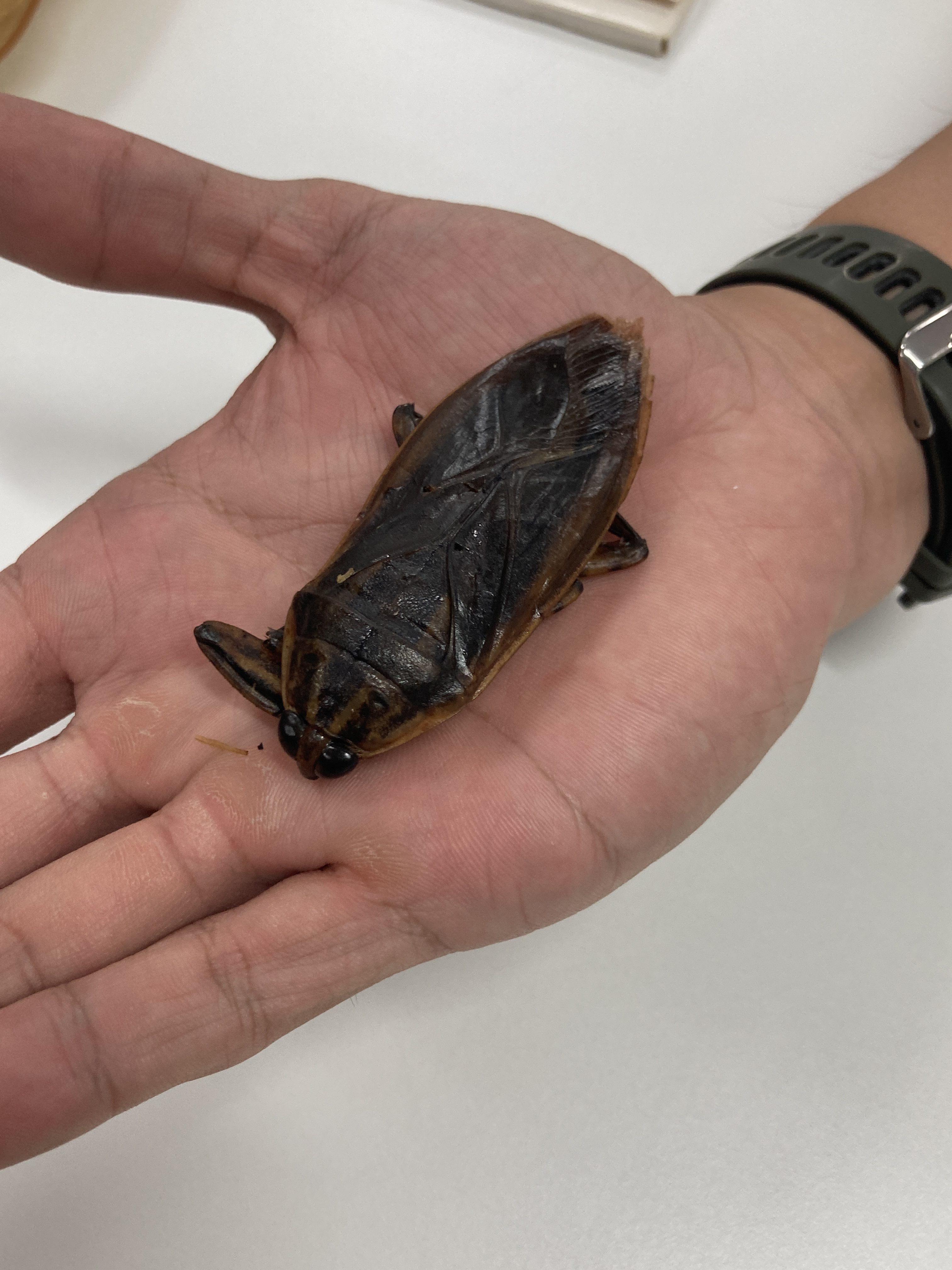 Photo by Ashley Tan
Photo by Ashley Tan
Interestingly, according to Foo, the scorpion apparently tastes like bak kwa with a bitter aftertaste.
As I take a chomp of its torso, my unrefined palate is unable to taste the meaty flavour. To me, it simply tastes salty and slightly charred.
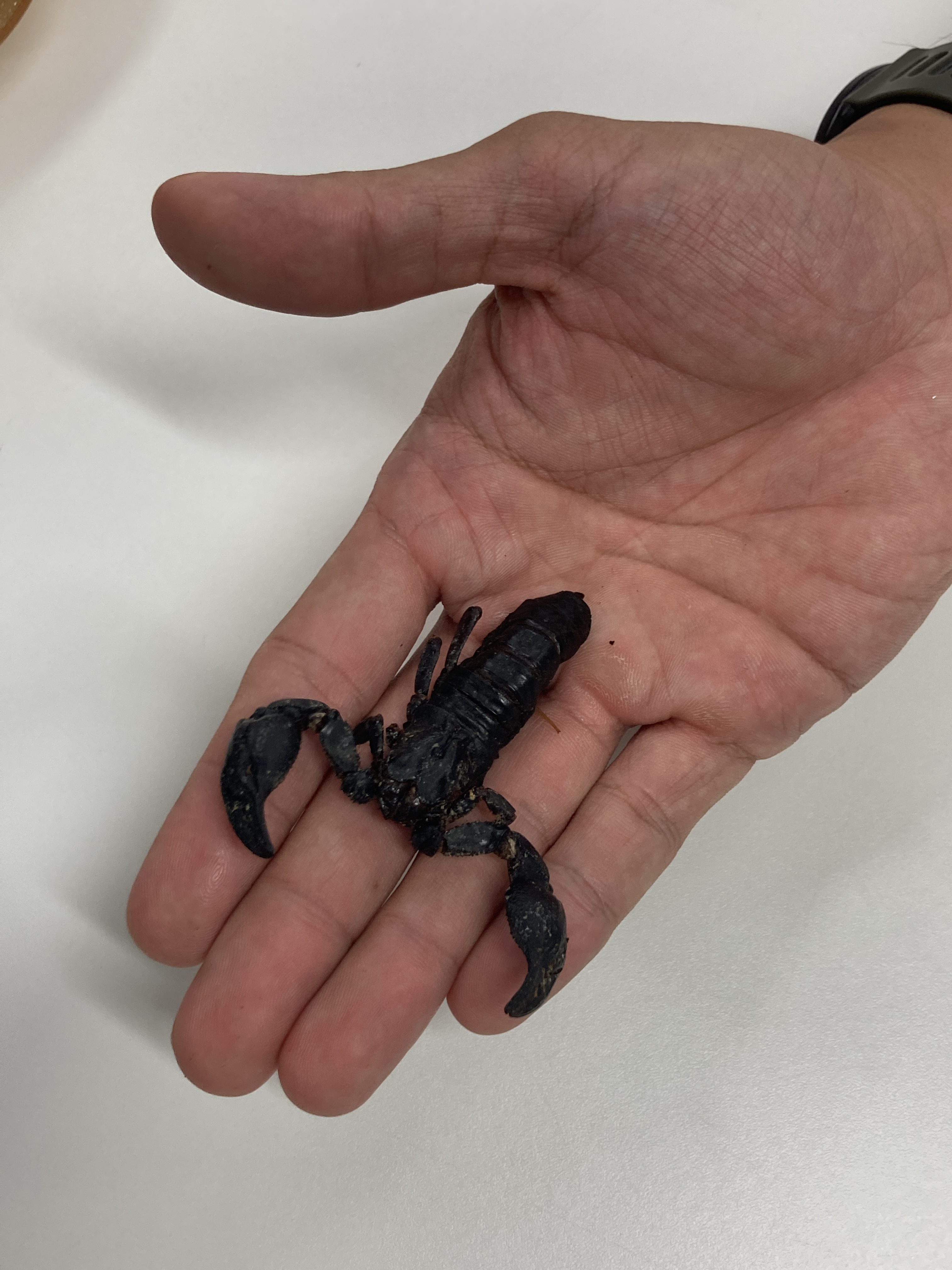 Photo by Ashley Tan
Photo by Ashley Tan
The most exotic specimen Foo has eaten is the zebra tarantula, which costs around S$16. A single tarantula comes uniquely packaged in a small can.
Although I didn't get to try the tarantula, it supposedly tastes like crab meat, something which celebrity chef Gordon Ramsay has testified to before.
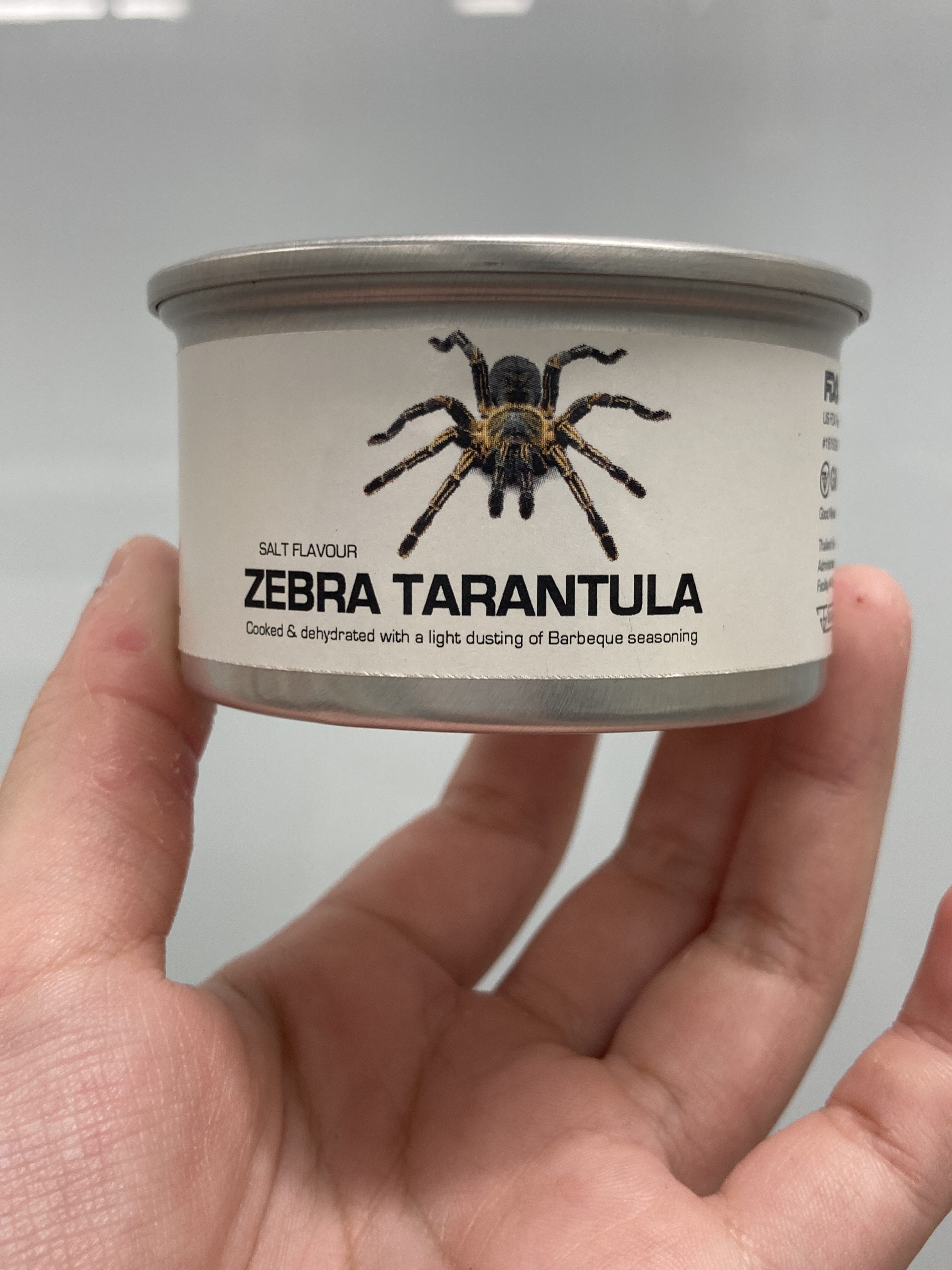 Photo by Ashley Tan
Photo by Ashley Tan
Foo assures that one does not need to fear eating venomous invertebrates like the scorpion and tarantula, as the venom is deactivated once they're cooked.
However, he cautions that some people might suffer allergic reactions to the remnants of the venom left behind.
Overall, my verdict on entomophagy: It was a unique experience, and I would recommend trying it at least once.
Who knows, you might take a liking to it too.
Normalising eating bugs
Foo foresees bugs becoming a staple in his diet, whenever it becomes readily available in Singapore.
He notes that with inflation and rising prices of protein sources like chicken and eggs, insects would be a good alternative.
Clearly from how some netizens responded to SFA's announcement in October, a good number of people in Singapore may disagree with Foo's sentiment.



Healing the Divide's Iris Koh has even started a petition against SFA's announcement, calling it a threat to public safety. Thus far, it has garnered over 600 signatures.
While Foo is able to somewhat understand the netizens' perspectives, he believes that permitting the sale and consumption of insects is a progressive move.
"So when you bring this in, people may think, oh yeah, we're becoming third world. Because we are bringing that way of living from a third world country into our country. So it's understandable, but I wouldn't say is exactly that we are becoming a third world country. But it's just that we are actually moving forward ahead in order to make sure that our human population, at least in Singapore, will be able to meet that protein requirements."
Foo concedes that normalising entomophagy here will not be an easy feat — he acknowledges that there exists a "gross factor", and that the unsavoury image of bugs has been perpetuated by media and will be challenging to purge.
"It will definitely take some time," he said, and adds that educating the public, including children, on the benefits of entomophagy and debunking the stigma surrounding creepy-crawlies might go a long way.
Foo sums up his thoughts towards the naysayers in a Facebook post responding to Koh's petition:
"All in all, eating insects is not a last resort, entomophagy and the import of insects for human consumption is part of Singapore food security and food sustainability. No one is forcing you to eat insects, it is an option that is open to you."
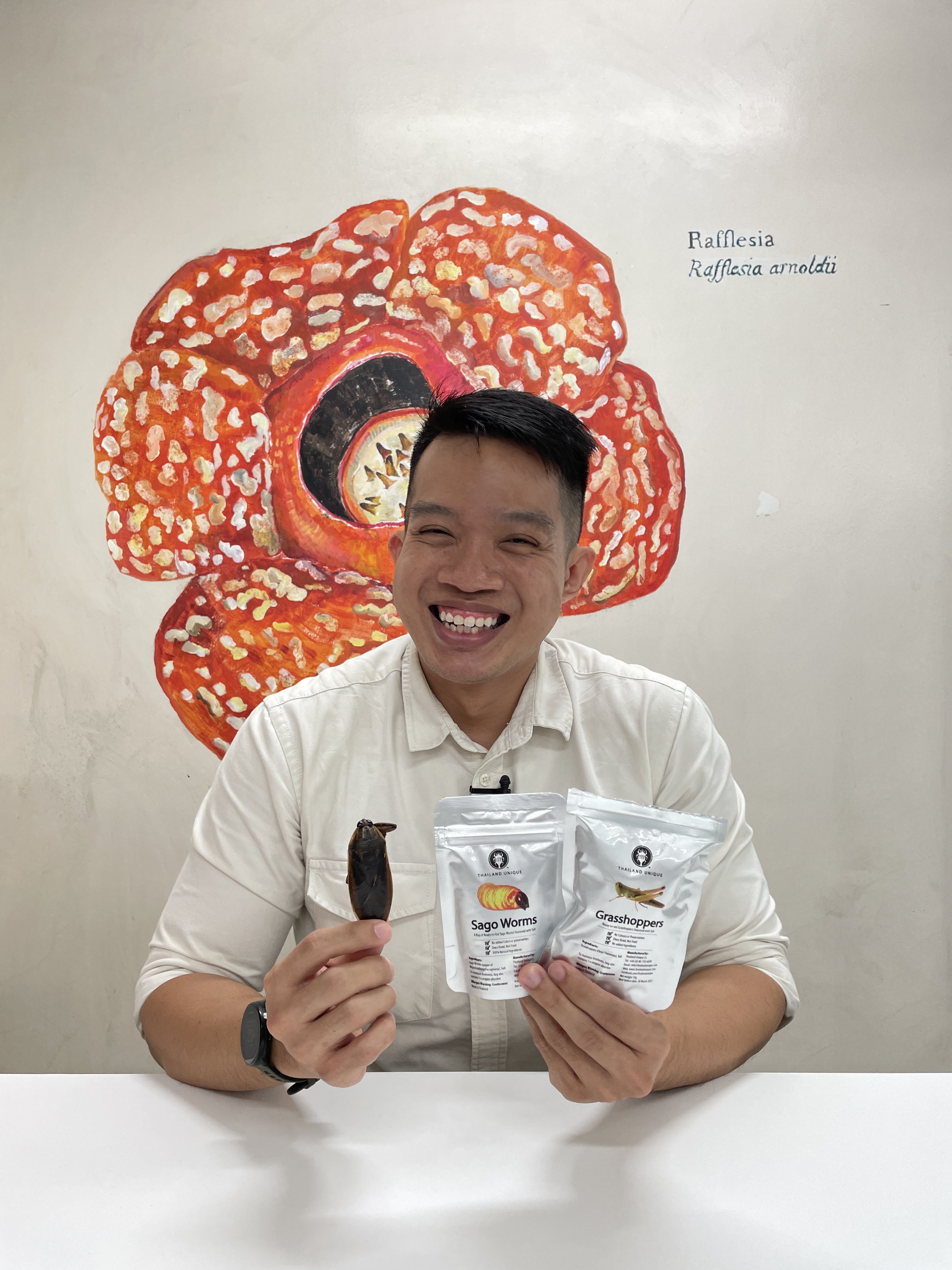 Photo by Zhangxin Zheng
Photo by Zhangxin Zheng
Top photo by Zhangxin Zheng and Foo Maosheng's IG
If you like what you read, follow us on Facebook, Instagram, Twitter and Telegram to get the latest updates.
